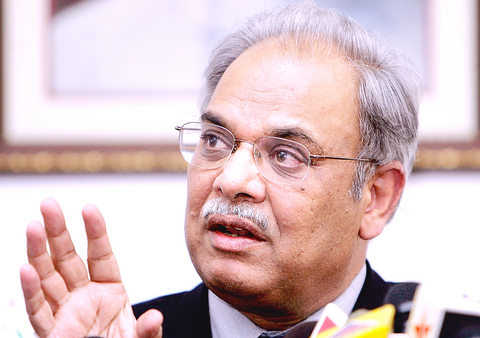Indian and Pakistani officials were wrapping up their latest round of peace talks yesterday, which have focused on terrorism and Kashmir -- the two key issues that have fueled decades of hostility between the two nuclear-armed neighbors.
Indian Foreign Secretary Shiv Shanker Menon and his Pakistani counterpart, Riaz Mohammed Khan, reviewed the gamut of India-Pakistan relations on Tuesday, including a slew of confidence building steps that the two rivals have taken since they began their dialogue nearly three years ago, an Indian official said.
"The talks reviewed the composite dialogue process, Kashmir and examined ways to implement a proposed anti-terror mechanism that the two countries have agreed to set up," said Navtej Sarna, spokesman of India's External Affairs Ministry, following the first day of talks.

PHOTO: AFP
Tuesday's interaction marked the resumption of peace talks that India suspended after bombs tore through Mumbai's commuter rail network in July, killing more than 200 people. New Delhi blamed the deadly attack on Pakistan's intelligence service and a militant group based in Pakistan -- allegations Islamabad denies.
Two months later, Indian Prime Minister Manmohan Singh and Pakistani President General Pervez Musharraf decided to resume negotiations when they met in Cuba on the sidelines of the Non-Aligned Movement Summit in September.
The key to the resumption of the process was a deal by the leaders to create what they described as an anti-terrorism mechanism that would help them work together to stop terrorists.
India has been pushing for joint efforts to fight terror in the hopes that involving Pakistani security agencies and providing them with evidence of the involvement of Pakistan-based militant groups would encourage the authorities in Islamabad to act against terrorist cells.
Pranab Mukherjee, India's external affairs minister -- who met Khan and other Pakistani officials later on Tuesday -- emphasized the importance of India and Pakistan joining hands in the fight against terrorism, Sarna said.
India and Pakistan have a history of hostile relations and have fought three wars since their partition upon independence from Britain in 1947.
India accuses Pakistan of funding and training the separatist rebels who cross over to the Indian portion of Kashmir and carry out terror strikes. Pakistan denies the charges, saying that it only offers the moral and diplomatic support to the rebels.
Although no major breakthrough is expected at the end of the talks, Indian officials were optimistic the peace dialogue was a positive step.

James Watson — the Nobel laureate co-credited with the pivotal discovery of DNA’s double-helix structure, but whose career was later tainted by his repeated racist remarks — has died, his former lab said on Friday. He was 97. The eminent biologist died on Thursday in hospice care on Long Island in New York, announced the Cold Spring Harbor Laboratory, where he was based for much of his career. Watson became among the 20th century’s most storied scientists for his 1953 breakthrough discovery of the double helix with researcher partner Francis Crick. Along with Crick and Maurice Wilkins, he shared the

OUTRAGE: The former strongman was accused of corruption and responsibility for the killings of hundreds of thousands of political opponents during his time in office Indonesia yesterday awarded the title of national hero to late president Suharto, provoking outrage from rights groups who said the move was an attempt to whitewash decades of human rights abuses and corruption that took place during his 32 years in power. Suharto was a US ally during the Cold War who presided over decades of authoritarian rule, during which up to 1 million political opponents were killed, until he was toppled by protests in 1998. He was one of 10 people recognized by Indonesian President Prabowo Subianto in a televised ceremony held at the presidential palace in Jakarta to mark National

US President Donald Trump handed Hungarian Prime Minister Viktor Orban a one-year exemption from sanctions for buying Russian oil and gas after the close right-wing allies held a chummy White House meeting on Friday. Trump slapped sanctions on Moscow’s two largest oil companies last month after losing patience with Russian President Vladimir Putin over his refusal to end the nearly four-year-old invasion of Ukraine. However, while Trump has pushed other European countries to stop buying oil that he says funds Moscow’s war machine, Orban used his first trip to the White House since Trump’s return to power to push for

LANDMARK: After first meeting Trump in Riyadh in May, al-Sharaa’s visit to the White House today would be the first by a Syrian leader since the country’s independence Syrian President Ahmed al-Sharaa arrived in the US on Saturday for a landmark official visit, his country’s state news agency SANA reported, a day after Washington removed him from a terrorism blacklist. Sharaa, whose rebel forces ousted long-time former Syrian president Bashar al-Assad late last year, is due to meet US President Donald Trump at the White House today. It is the first such visit by a Syrian president since the country’s independence in 1946, according to analysts. The interim leader met Trump for the first time in Riyadh during the US president’s regional tour in May. US envoy to Syria Tom Barrack earlier